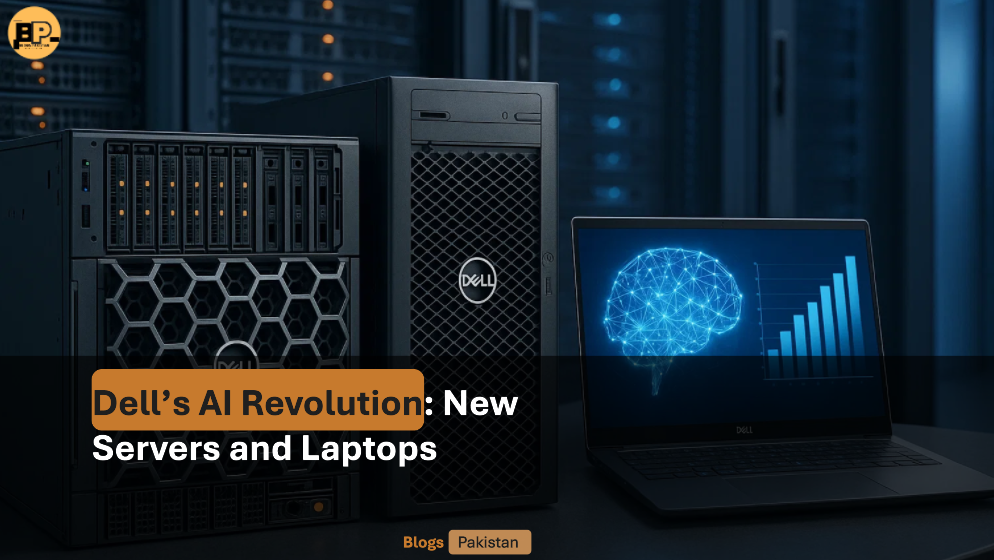The AI Boom Meets Cutting-Edge Hardware
As businesses scramble to harness artificial intelligence, Dell Technologies has thrown its hat into the ring with a game-changing announcement: new AI servers powered by Nvidia’s Blackwell Ultra chips. Unveiled this week, these servers promise to accelerate AI model training by up to four times compared to older models. But Del isn’t stopping there—the company also introduced a laptop tailored for AI developers, signaling a bold push to dominate both enterprise infrastructure and on-device AI capabilities.
Let’s unpack how Dell’s latest moves could reshape the AI landscape—and why competitors like Super Micro Computer are feeling the heat.
Breaking Down Dell’s AI Powerhouse Servers
Built for Speed: The Blackwell Ultra Advantage
Dell’s new servers come in air-cooled and liquid-cooled configurations, supporting up to 192 Nvidia Blackwell Ultra chips. For enterprises craving even more firepower, these systems can be customized to house 256 chips. This leap in processing capacity means businesses can train complex AI models faster than ever, slashing development timelines and boosting productivity.
Arthur Lewis, President of Del l’s Infrastructure Solutions Group, teased “competitive pricing” for the servers, though specifics remain under wraps. With AI infrastructure costs soaring, Dell’s emphasis on affordability could make these systems a go-to for mid-sized firms and tech giants alike.
Why Liquid Cooling Matters
Liquid-cooled servers aren’t just a niche novelty—they’re critical for handling the intense heat generated by high-performance AI workloads. By offering both cooling options, Del l caters to diverse enterprise needs, whether it’s a cost-conscious startup or a data center prioritizing energy efficiency.
The AI Server Wars: Dell vs. Super Micro
While Dell rides the AI wave, it’s not smooth sailing. Rival Super Micro Computer has also capitalized on the AI server boom, but both companies face margin pressures due to stiff competition and rising production costs.
- Dell’s Margin Strategy: In February, Del`l projected a dip in adjusted gross margins for fiscal 2026. To offset this, the company plans to prioritize networking and storage product sales, which typically offer higher profitability.
- Super Micro’s Tariff Trouble: Earlier this month, Super Micro warned of lower-than-expected Q4 revenue, blaming economic uncertainty fueled by tariffs. This vulnerability gives Del.l an opening to capture market share.
The takeaway? In the race for AI dominance, efficiency and diversification will separate winners from laggards.
Beyond Servers: Dell’s Play for On-Device AI
Meet the Pro Max Plus Laptop
Dell’s surprise reveal wasn’t limited to servers. The new Pro Max Plus laptop, designed specifically for AI developers, features a neural processing unit (NPU) that enables engineers to run large AI models locally—no cloud required. This shift to on-device processing addresses two pain points: latency and data privacy.
Imagine training a machine learning model during a flight or in a remote location without internet access. The Pro Max Plus turns this into reality, empowering developers with unprecedented flexibility.
The Future of Hybrid AI
By bridging cloud-based and on-device AI, Dell is betting on a hybrid future. This approach not only reduces reliance on costly cloud services but also aligns with growing demand for edge computing solutions in industries like healthcare and manufacturing.
Nvidia’s Role: A Partnership Driving Innovation
Dell’s servers will also support Nvidia’s upcoming Vera CPUs, successors to the Grace server processors. Looking further ahead, the company plans to integrate Nvidia’s Vera Rubin chips, slated to follow the Blackwell series.
This tight-knit collaboration with Nvidia ensures Dell stays at the forefront of AI hardware innovation. For enterprises, it means access to a future-proof ecosystem that evolves alongside AI advancements.
Challenges Ahead: Balancing Growth and Profitability
Despite the excitement, Dell faces hurdles:
- Cost Management: High R&D and production expenses could strain margins if demand doesn’t meet projections.
- Market Saturation: With every tech giant racing to launch AI solutions, differentiation becomes critical.
- Economic Headwinds: Global tariff disputes and supply chain snarls remain wild cards.
Lewis’s emphasis on profitability suggests Dell is taking a measured approach—one that prioritizes sustainable growth over reckless expansion.
What This Means for Enterprises
For businesses, Dell’s new offerings are a double win:
- Speed: Faster AI training means quicker time-to-market for products.
- Flexibility: Choose between cloud-dependent or offline AI workflows.
- Cost Savings: Competitive pricing and reduced cloud dependency lower long-term expenses.
Industries like finance, healthcare, and autonomous driving could see immediate benefits, leveraging these tools to refine algorithms, analyze data, and innovate rapidly.
The Bigger Picture: AI’s Infrastructure Demands
Dell’s launch underscores a broader trend: AI’s hunger for robust infrastructure. As models grow more complex, enterprises need hardware that keeps pace. Companies slow to adopt next-gen servers risk falling behind in the AI arms race.
Final Thoughts: Dell’s Bold Bet on an AI-Driven Future
Dell’s latest moves aren’t just about selling servers and laptops—they’re about shaping the future of enterprise technology. By addressing both infrastructure and development needs, the company positions itself as a one-stop shop for AI-driven businesses.










